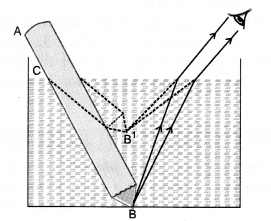Light-Reflection and Refraction
Class 10th Science Chapter HOTs
HOTS Questions for Class 10 Science Chapter 10 Light Reflection and Refraction
Question
1.
You have a spherical mirror. The image of an object placed
in front of the mirror is virtual. If the position of the object is changed, the
image remains virtual and erect. Is the spherical mirror concave or convex
?
Answer:
Since convex mirror always forms a virtual and erect image irrespective of the
position of the object in front of the mirror. So the given spherical mirror is
convex mirror.
Question
2.
The following table gives the value of refractive indices
of a few media.
Name the medium having highest optical density and a medium having lowest
optical density.
(Similar to Text Book Question, CBSE 2012, 2016)
Answer:
Optical
density of a medium is directly proportional to its refractive index. Therefore,
diamond has the highest optical density and ice has the lowest optical
density.
Question
3.
Refractive indices of kerosene, turpentine and water are
1.44, 1.47 and 1.333 respectively. Through which of these media, light travels
fast ? Explain. (Similar to Text Book Question)
Answer:![]()
Since, refractive index of water (1.333) is less than the refractive indices of
kerosene and turpentine, so light travels faster in water than in kerosene and
turpentine. Refractive indices of media A, B, C and D are given below :
Question
4.
In which of these four media is the speed of light
(i) maximum and (ii) minimum ? Find refractive index of medium D w.r.t. medium
A. (New CBSE Sample Paper, CBSE 2011, 2013, 2016)
Answer:![]()
Since, refractive index of medium A is the least, so speed of light in medium A
is maximum.
Refractive index of medium D is the highest, so the speed of
light in medium D is minimum.![]()
Question
5.
The following table gives the values of refractive indices
of a few media
Use this table to give an example of (i) a medium pair so that light speeds up
when it goes from one of these media to another, (ii) a medium pair so that
light slows down when it goes from one of these media to another. (CBSE Sample
Paper 2008)
Answer:
- Light speeds up or speed of light increases when it travels from a medium of higher refractive index to a medium of lower refractive index. Therefore, speed of light increases when it travels from crown glass or water or from rock salt to water or from diamond to water.
- Light slows down or speed of light decreases when it travels from a medium of lower refractive index to a medium of higher refractive index. For example, when it travels from water to crown glass or from water to diamond.
Question
6.
Explain with the help of a diagram, why a pencil partly
immersed in water appears to be bent at the water surface ? (CBSE (Delhi) 2008,
2011)
Answer:
It is due to
the refraction of light.
Consider a pencil AB, such that CB portion of the pencil is immersed in water as
shown in figure. Rays of light from the tip (B) of the pencil bend away from the
normal as they go from water to air. The refracted rays appear to come from
point B’. Thus, the immersed portion of pencil in water appears as CB’. Hence,
the pencil appears to bent at the water surface. Moreover, the immersed portion
of the pencil in water also appears to be shorter than the actual length of the
pencil.